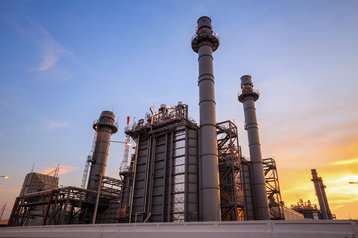US oil and gas major Chevron and San Francisco-based hedge fund Engine No. 1 have partnered to develop and scale natural gas-powered power plants to serve co-located data centers in the Southeast, Midwest, and West of the US.
The two companies will collaborate with GE Vernova, a power generation equipment provider, to establish a multi-gigawatt power plant using seven GE Vernova 7HA natural gas turbines. The turbines were acquired under a slot reservation agreement—a contract that allows a buyer to reserve a specific time slot for a service or activity—to support an accelerated deployment timeline.
According to reporting from the FT, the project is expected to cost up to $8 billion.
The partnership aims to develop up to 4GW, with an in-service target date at the end of 2027. If the initial deployment is successful, the companies suggest that there is potential for further expansion.
Chris James, founder and chief investment officer of Engine No. 1, said: “Energy is the key to America’s AI dominance. By using abundant domestic natural gas to generate electricity directly connected to data centers, we can secure AI leadership, drive productivity gains across our economy, and restore America’s standing as an industrial superpower.”
The power generated by the turbines will directly feed the data centers in an off-grid system. The project will also be designed with the ability to integrate carbon capture and storage (CCS) to reduce its emission profile, the release stated. Chevron has invested in several CCS projects to date. Most recently, in April, it announced a direct investment in CCS firm ION Clean Energy.
“President Trump’s pro-American energy policies and commitment to energy and AI dominance give us the confidence to invest in projects that will create American jobs and strengthen our national security,” Mike Wirth, CEO of Chevron, said.
Engine No. 1 is an activist and impact-focused investment firm founded in 2020. In 2021, it became the talk of Wall Street in its campaign against fossil fuel giant ExxonMobil’s board. The firm demanded reform in its focus on fossil fuels, arguing that it threatened future returns.
Despite owning only 0.02 percent of the company, Engine No. 1 convinced Exxon's three largest shareholders, Blackrock, Vanguard, and Slate Street, to back the plans. This led Exxon to expand its board, add a director with a background in sustainable investing, and invest in CCS.
Reacting to the partnership with Chevron, Chris James argued that the investment is consistent with the Exxon campaign.
“This is not a pivot. The Exxon campaign was focused on governance and capital allocation as a way to create value for shareholders. It was not about ideology or fossil fuels or renewables,” James told the FT.
“This partnership with Chevron and GE is about allocating capital in an economy that is undergoing a re-industrialisation and needs dramatically more power . . . This will lead to value creation for shareholders.”
Notably, Chevron’s deal with Engine No. 1 follows ExxonMobil's commitment to developing natural gas capacity specifically for the data center sector. In December, Exxon revealed it was planning to develop a 1.5GW natural gas-fired power plant dedicated to the data center sector.
The announcements by both oil and gas companies reflect a broader market move, as natural gas demand increases to meet the rising energy demand of artificial intelligence data centers.
With the reelection of Donald Trump to the presidency, the expectation is that regulations for new gas generation and pipelines will be streamlined to make good on his promise to “drill baby drill.” Data centers stand to be one of the primary beneficiaries of this move.
Earlier this week, it was reported that the first Stargate data center in Abilene, Texas, would be directly powered by an onsite natural gas. Developers of the project submitted an application to site a 360.5MW power plant that will feed the data center behind the meter.
Late last year, Meta announced a new $10 billion data center in Richland Parish, northeast Louisiana. Entergy Louisiana will build and operate 2.26GW of on-site natural gas generation, which will power the center.




